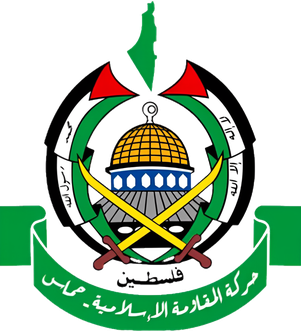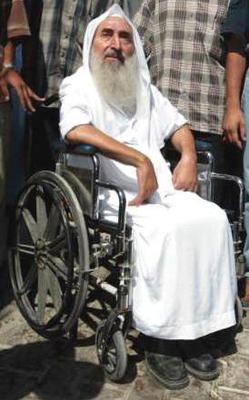
The Gaza Strip, or simply Gaza, is a polity and the smaller of the two Palestinian territories. On the eastern coast of the Mediterranean Sea, Gaza is bordered by Egypt on the southwest and Israel on the east and north.

Hamas, an acronym of its official name, Harakat al-Muqawama al-Islamiya, is a Palestinian Sunni Islamist political and military movement governing parts of the occupied Gaza Strip.

The Israeli–Palestinian conflict is an ongoing military and political conflict in the Levant. Beginning in the mid-20th century, it is one of the world's longest-continuing conflicts. Key areas of the conflict include the Israeli occupation of the West Bank and Gaza Strip, the status of Jerusalem, Israeli settlements, borders, security and water rights, as well as Palestinian freedom of movement and the Palestinian right of return.
This timeline of the Israeli–Palestinian conflict lists events from 1948 to the present. The Israeli–Palestinian conflict emerged from intercommunal conflict in Mandatory Palestine between Palestinian Jews and Arabs, often described as the background to the Israeli–Palestinian conflict. The conflict in its modern phase evolved since the declaration of the State of Israel on May 14, 1948 and consequent intervention of Arab armies on behalf of the Palestinian Arabs.

Sheikh Ahmed Ismail Hassan Yassin was a Palestinian politician and imam who founded Hamas, a militant Islamist and Palestinian nationalist organization in the Gaza Strip, in 1987.

Intermittent discussions are held by various parties and proposals put forward in an attempt to resolve the ongoing Israeli–Palestinian conflict through a peace process. Since the 1970s, there has been a parallel effort made to find terms upon which peace can be agreed to in both the Arab–Israeli conflict and in the Palestinian–Israeli conflict. Notably the Camp David Accords between Egypt and Israel, which included discussions on plans for "Palestinian autonomy", but did not include any Palestinian representatives. The autonomy plan would not be implemented, but its stipulations would to a large extent be represented in the Oslo Accords.

The Arab–Israeli conflict is the phenomenon involving political tension, military conflicts, and other disputes between various Arab countries and Israel, which escalated during the 20th century. The roots of the Arab–Israeli conflict have been attributed to the support by Arab League member countries for the Palestinians, a fellow League member, in the ongoing Israeli–Palestinian conflict; this in turn has been attributed to the simultaneous rise of Zionism and Arab nationalism towards the end of the 19th century, though the two national movements had not clashed until the 1920s.

Nahal Oz is a kibbutz in southern Israel. Located in the northwestern part of the Negev desert close to the border with the Gaza Strip and near the development towns of Sderot and Netivot, it is under the jurisdiction of Sha'ar HaNegev Regional Council. In 2021, it had a population of 471. A nearby IDF military base is known by the same name.

The Fatah–Hamas conflict is an ongoing political and strategic conflict between Fatah and Hamas, the two main Palestinian political parties in the Palestinian territories, leading to the Hamas takeover of the Gaza Strip in June 2007. The reconciliation process and unification of Hamas and Fatah administrations remains unfinalized and the situation is deemed a frozen conflict.
The future of Palestinian prisoners detained by Israel in the context of the Israeli–Palestinian conflict is considered central to progress in the Israeli–Palestinian peace process. Cases of prison sentences include the charges of terrorism or being a member of an "illegal terrorist organization", such as Hamas or prior to the Oslo Accords the Palestine Liberation Organization, but according to some accounts also by political activism such as raising a Palestinian flag.

The Dahiya doctrine, or Dahya doctrine, is a military strategy involving the destruction of civilian infrastructure in order to pressure hostile regimes. It is a type of asymmetric warfare. It endorses the employment of "disproportionate force" to secure that end. The doctrine was outlined by former Israel Defense Forces (IDF) Chief of General Staff Gadi Eizenkot.
Alastair Crooke CMG, born 1949, is a former British diplomat, and is the founder and director of the Beirut-based Conflicts Forum, an organisation that advocates for engagement between political Islam and the West. Previously he was a ranking figure in both British intelligence (MI6) and European Union diplomacy.

Legislative elections were held in the Palestinian territories on 25 January 2006 in order to elect the second Palestinian Legislative Council (PLC), the legislature of the Palestinian National Authority (PNA). The result was a victory for Hamas, contesting under the list name of Change and Reform, which received 44.45% of the vote and won 74 of the 132 seats, whilst the ruling Fatah received 41.43% of the vote and won 45 seats.

The Battle of Gaza was a military conflict between Fatah and Hamas that took place in the Gaza Strip from 10 to 15 June 2007. It was a prominent event in the Fatah–Hamas conflict, centered on the struggle for power after Fatah lost the 2006 Palestinian legislative election. The battle resulted in the dissolution of the unity government and the de facto division of the Palestinian territories into two entities: the West Bank governed by the Palestinian National Authority (PNA), and the Gaza Strip governed by Hamas. Hamas fighters took control of the Gaza Strip, while Fatah officials were either taken as prisoners, executed, or expelled. The Palestinian Centre for Human Rights reported that at least 161 people were killed and more than 700 were wounded during the fighting.

The two-state solution to the Israeli–Palestinian conflict envisions an independent State of Palestine alongside the State of Israel, in the region west of the Jordan River. The major points of contention are: the boundaries of the two states, the status of Jerusalem, the Israeli settlements and the right of return of Palestinian refugees.

Adania Shibli is a Palestinian author and essayist. She is mainly known for the 2020 translation of her novel Minor Detail into English, German and other languages, and for a public controversy in Germany following the cancellation of a literary prize for this book, originally scheduled for the 2023 Frankfurt Book Fair.
Globalize the Intifada is a slogan that has been used for advocating for global activism in support of Palestinian resistance against Israeli control. The term intifada being derived from the Arabic word nafada meaning to "shake off", refers to Palestinian uprisings or resistance against Israeli control, and the call to "globalize" it suggests extending the spirit and actions of these uprisings beyond the regional context to a worldwide movement.
Daniel Levy is a British–Israeli analyst, commentator, author, and former advisor to the Israeli government with expertise on Middle East and the Israeli–Palestinian conflict. He was formerly an Israeli negotiator as part of the Taba summit and Oslo 2 peace process. He is current president of the U.S./Middle East Project (USMEP) and was among the founders of the organization J Street.










